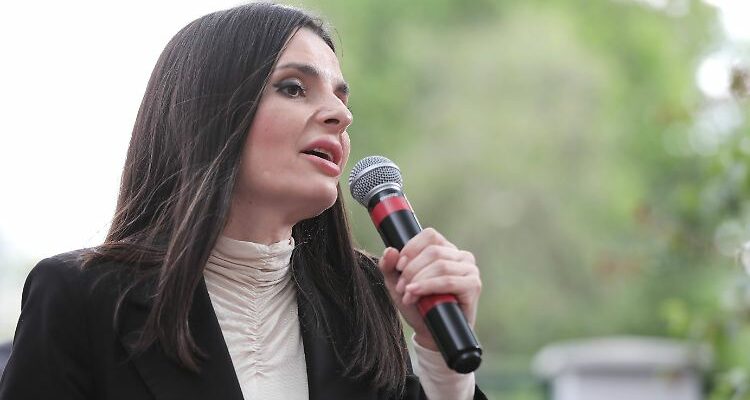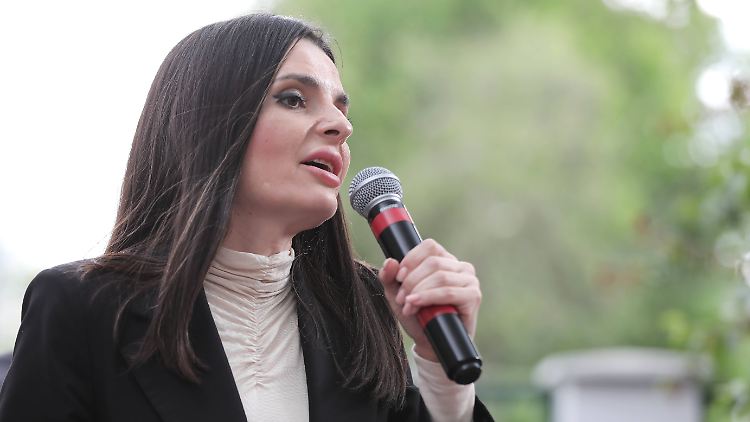The Republic of Moldova wants to join the EU, but Russia could prevent the final step to the West. In addition to Transnistria, the Gagauz region is also asking Moscow for “protection.” Turkey also plays a role.
Transnistria has been in greater focus since Russia’s major attack on Ukraine. The small separatist country in the Republic of Moldova borders directly on Ukraine, but is particularly close to Russia. That’s why the leadership of the autonomous but internationally unrecognized region officially asked Moscow for “protection” at the end of February. This has happened several times in the past, and the West is now reacting sensitively to such reports. After all, we know what can happen when pro-Russian areas present themselves to their supposed protectors.
Unnoticed by many, another pro-Russian region on Moldova’s territory has asked for “protection”: Gagauzia. Prime Minister Evghenia Guțul accused the Moldovan authorities in Russian state media of suppressing the rights of Gagauzians. The government in Chișinău is “the conductor of an imposed Western political course.”
There is a “massive division and polarization between pro-Russian movements and the pro-European government” in the Republic of Moldova, emphasizes the political scientist and risk analyst who works primarily in Eastern Europe Hannes Meissner in the ntv podcast “Learned something again”.
Autonomous territory for 30 years
Gagauzia consists of two larger and two smaller parts in the Republic of Moldova that are not connected to each other. The autonomous region is only about twice the size of Berlin but more than half the size of Transnistria and accounts for about five percent of Moldova’s territory. Around 130,000 people live here. Unlike in Transnistria, there was no war in the early 1990s after the collapse of the Soviet Union. At the end of 1994, the “Autonomous Territorial Unit of Gagauzia” was officially established within the Republic of Moldova.
Since then, things have remained largely quiet in Gagauzia, apart from minor conflicts. In 2008, for example, the Gagauz government recognized the pro-Russian separatist regions of Abkhazia and South Ossetia in Georgia as independent states in order to do Russia a favor.
However, the Gagauz government repeatedly complains that the Moldovan government does not support them enough. The region has economic problems and there is hardly any work, which is why tens of thousands of Gagauz people have to earn money as guest workers in Russia for most of the year.
Putin promise
Gagauzia is very close to the Kremlin and is critical of Moldova’s proximity to the European Union. In 2014, 98 percent of the population of Gagauzia voted for integration into the customs union with Russia, Belarus and Kazakhstan, while 97 percent were against rapprochement with the EU.
The Gagauz gubernatorial elections in March last year caused further unrest in relations with the Moldovan mother state. Shor Party candidate Evghenia Guțul won the election. The extremely wealthy Israeli-Moldovan oligarch and party founder Ilan Shor supported them. In her victory speech she made it clear that she wanted to integrate Gagauzia more closely with Russia.
Three months later, the Shor party was banned in Moldova – the reason: infiltration by Russia. “Shor himself was sentenced to 15 years in prison in Moldova for mass fraud in 2012 and 2014. However, he fled the country and is avoiding prison. However, he is still trying to advance the polarization of Moldova, the government of Maia Sandu to destabilize and bring the country back onto the pro-Russian course,” says Eastern Europe analyst Meissner.
Guțul took up her governorship in July as an independent candidate because of the party ban. Because of her membership in the Shor party, Moldovan President Sandu does not recognize her as head of government of Gagauzia.
The 37-year-old politician became known in the West primarily because she appeared at the beginning of this month Telegram a photo with Vladimir Putin published and wrote that the Russian President had personally promised her at the meeting at the World Youth Festival in Sochi to “support Gagauzia in defending its rights, powers and positions on the international stage.”
“Three key themes”
The connection to Russia could look like this: The Gagauz head of government met several top officials during her visit to Russia and spoke to them about “three key issues,” writes Das Institute for the Study of War (ISW). It was about a special gas tariff for Gagauzia, the opening of accounts for Gagauz companies and individuals within the Russian Mir payment system and details on excise taxes and customs duties so that companies from Gagauzia can do business with Russia more easily.
With Gagauzia, Moscow could create another de facto satellite state on the territory of an EU candidate country. “The opening of the Russian markets to Gagauzia and the associated tax advantages are intended to prevent Moldova from leaving the Commonwealth of Independent States (CIS),” writes the ISW.
The CIS is an alliance of the former Soviet states from which Moldova wants to leave as the third country – after Ukraine and Georgia. In addition, Russia’s actions in Gagauzia could create “disagreements in Moldova’s economic relations that would make accession to the EU more difficult or even prevent it,” analyzes the American think tank Jamestown Foundation.
Free gas from Russia?
Gagauzia’s own gas deliveries would also make it more difficult for the mother country Moldova to break away from Russia. Moldova would become even more vulnerable to Russian “energy blackmail plans,” according to the ISW. The country actually wants to get out of its decades-long dependence on Russian energy. If individual separatist areas receive their own deliveries, that will hardly work. You can see this in Transnistria: the separatist country has been receiving free gas transfers from Russia for decades. “Gas deliveries have always been a strategy of Moscow’s political influence,” Meissner makes clear.
In addition, Guțul apparently sees her sphere of influence as not only within the borders of Gagauzia. She and oligarch Shor want to meet soon with the heads of the Socialist and Communist Parties of Moldova as well as the Party of Moldovan Revival: Igor Dodon, leader of the Socialists and predecessor of the pro-European President Sandu. Dodon formed an electoral alliance in parliament with party leader Vladimir Voronin’s communists in 2021. The Party of Rebirth is in turn linked to the banned Shor Party.
It is quite possible that Guțul is working on a pro-Russia coalition in Moldova. There will be presidential elections in the republic at the end of this year and parliamentary elections next year. These are good prospects for the Kremlin. It would then be even easier to keep the Republic of Moldova within its own post-Soviet area and prevent the country from joining the EU.
Turkey should also provide “protection”.
But Turkey is also involved in Gagauzia. The pro-Russian region has also asked Ankara for “protection” from Moldova. Guțul said Turkey must influence the Moldovan authorities so that the region’s special legal status is not violated.
Background for the request: the Gagauz people traditionally maintain close relations with Ankara and belong to the group of Turkic-speaking peoples. The Turkish government led by President Recep Tayyip Erdogan therefore regularly visits the region, and Gagauzia’s head of government made her first trip abroad last year not to Russia, but to Turkey.
“Historically and culturally, Gagauzia stands between Russians and Turkey. They are a people of Turkish origin with an Orthodox religion. In the current situation, they have a political and socio-economic interest in maintaining the status quo.” Turkey has invested massively in Gagauzia in recent years, especially in the education and cultural sectors, reports Meissner in the podcast.
Along with Transnistria, Gagauzia has long been the second state within a state on the territory of the Republic of Moldova – a second puppet state for Russia, albeit with special relations to Turkey. This makes the situation particularly complicated for everyone involved.
“Learned something again” is a podcast for those who are curious: Why would a ceasefire probably just be a break for Vladimir Putin? Why does NATO fear the Suwalki Gap? Why does Russia have iPhones again? What small behavioral changes can save 15 percent energy? Listen in and get a little smarter three times a week.
You can find all episodes in the ntv app RTL+, Amazon Music, Apple Podcasts and Spotify. For all other podcast apps you can use the RSS feed.
You have a question? Please send us an email to [email protected]

